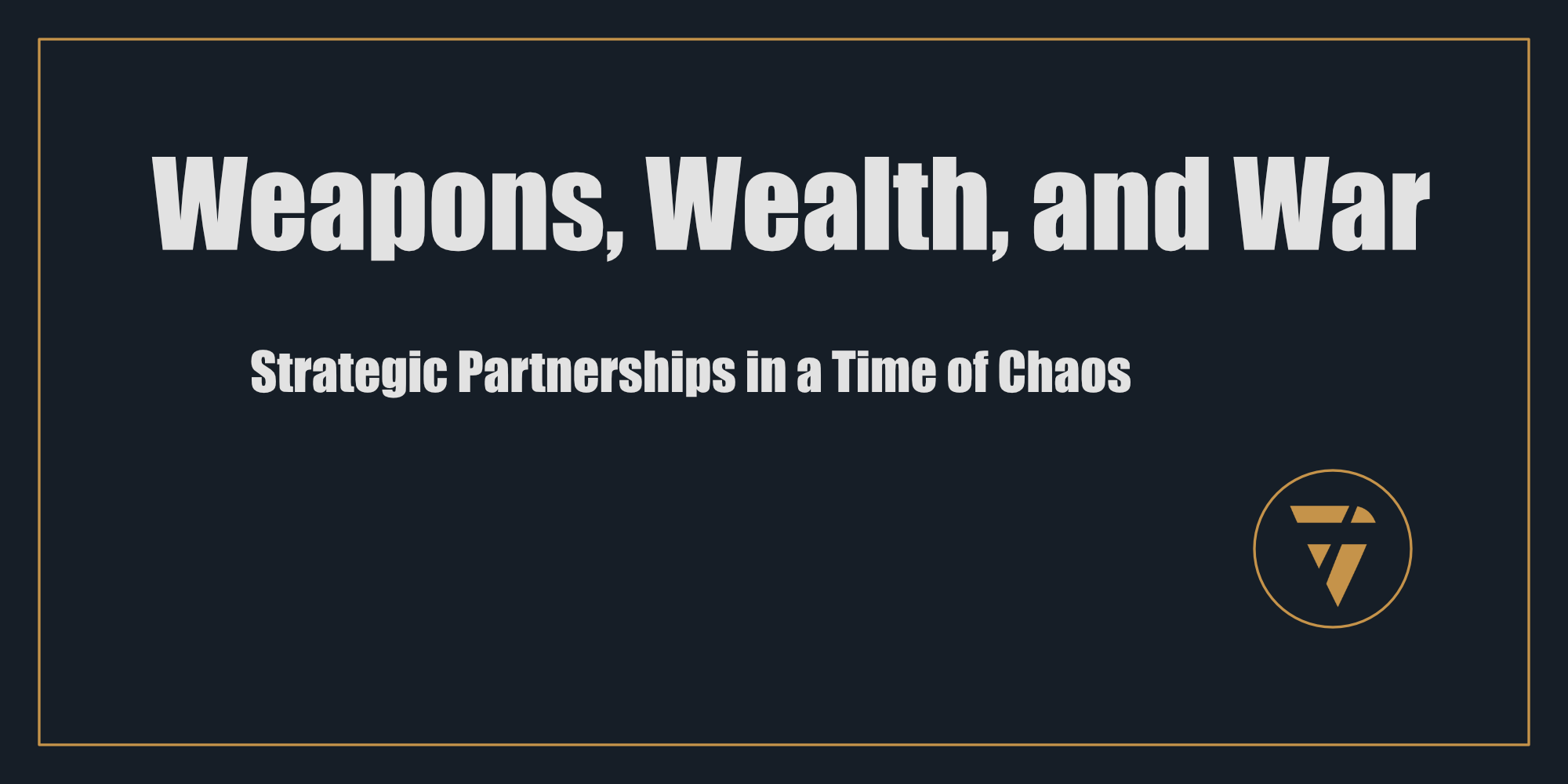Weapons, Wealth, and War

Strategic Partnerships in a Time of Chaos
This is the business of survival in a fracturing world. War is not just about bullets and borders, it's an economy unto itself, a force that reshapes global markets, realigns power structures, and forces nations and corporations alike into existential recalibration. It is an accelerator of history, burning away outdated alliances, and forging new ones in the fire of necessity.
We are witnessing the early stages of a global realignment unlike anything seen in modern history. The American empire—long the backbone of international stability—is faltering under the weight of internal decay and external pressures. Its once-unchallenged influence is giving way to a multipolar world where new power brokers emerge daily, each leveraging warfare as both a business and a bargaining tool.
From the factories of the military-industrial complex to the backrooms of sovereign wealth funds, war is being treated less as a crisis and more as an investment. The biggest players—nations, corporations, and mercenary entities—are not waiting to react. They are engineering the future in real time, forming alliances that will dictate who survives and who collapses as this century’s conflicts unfold.
In this chaos, strategic partnerships are no longer optional; they are the currency of survival.
- Who supplies the weapons, and who profits from them?
- Which corporations act as silent kingmakers, tilting wars in their favour?
- How are emerging powers leveraging conflict to reposition themselves?
- Where does money move when the old order begins to crumble?
This is the battlefield of the future, not defined by ideology, but by pragmatism. The side with the best alliances wins.
The Mechanics of Modern Warfare: A Market, Not a Morality Play
The days of clear-cut battle lines are over. Wars are now waged by a mix of state actors, private military companies (PMCs), insurgencies, and multinational interests with no flag. In this theatre of endless conflict, supply chains are as critical as strategies, and economic leverage often outweighs firepower.
Weapons as Leverage
In war, weapons are not just tools of destruction, they are bargaining chips. The suppliers of arms are not simply manufacturers; they are geopolitical kingmakers. Nations without direct military capacity wield influence by controlling access to crucial weaponry. Consider how Turkey has transformed itself into a power player, not by its military strength alone, but by becoming a key supplier of drones and munitions to conflicts where NATO hesitates to intervene.
Private Military Corporations: The Armies of Capital
Wagner. Blackwater. Executive Outcomes. The privatization of war has fundamentally altered conflict dynamics. States no longer need to maintain standing armies when they can contract elite, for-profit warriors to handle their dirty work. These PMCs often answer not to governments, but to capital—whoever pays the most. This means strategic partnerships are not just between states, but between moneyed interests whose concerns are not national security, but ROI.
Sanctions and Black Markets: How Wealth Moves in Wartime
As nations impose sanctions to cripple their enemies, global finance adapts. There is no such thing as a true blockade—only a price tag for bypassing it. China, Russia, Iran, and various Gulf states have already established shadow banking networks to circumvent Western financial controls. Cryptocurrencies, sovereign-backed stablecoins, and covert trade routes ensure that sanctioned nations do not just survive, but thrive. Those who control these networks control the future of economic warfare.
The Power Players: Who is Winning the Next War Before It Begins?
Every war has winners and losers. The ones who understand the power of partnerships in wartime are already positioning themselves to come out ahead.
1. China and the New Order
While the US drowns in political and economic instability, China is securing energy deals, military alliances, and trade routes that will outlast any single conflict. The Belt and Road Initiative is not just an infrastructure project; it is a wartime logistics network in the making. Beijing is embedding itself in Africa, South America, and Southeast Asia with long-term, high-stakes partnerships that prioritize supply chain security over short-term profits.
2. The Middle East: The Power of Petroweapons
Energy is still the world’s most valuable weapon, and the Gulf states know it. Saudi Arabia and the UAE are moving from being just oil suppliers to being strategic military hubs, balancing ties between the West, Russia, and China with ruthless efficiency. Qatar, once seen as a minor player, now dictates terms in global diplomacy simply by hosting the right players at the right time.
3. Russia: Master of Asymmetric Warfare
Moscow understands something Washington has forgotten—you do not need to outgun your enemy; you only need to outlast them. Through economic resilience, black market arms trades, and strategic destabilization, Russia has mastered the art of turning weakness into strength. It is less about full-frontal war, more about creating economic and political conditions where the opposition implodes from within. Ukraine, thank you.
4. The American Military-Industrial Complex: Profiting from Decline
The US may be struggling politically, but its weapons industry is thriving. Raytheon, Lockheed Martin, and Northrop Grumman are among the most profitable war corporations on earth. The Pentagon does not just wage war—it sustains it. The true power in Washington is not the politicians; it is the corporations whose supply chains ensure that conflict remains perpetual.
Strategic Partnerships in an Age of Uncertainty
War is no longer an event—it is a condition. And in this condition, those who thrive are those who can adapt, realign, and leverage partnerships intelligently.
1. The Rise of "War Economies"
Nations and corporations are structuring their economies not for peacetime prosperity, but for permanent conflict management. Defence contracts are becoming long-term investments rather than emergency expenditures. Companies that can integrate military, technological, and financial resources into a seamless wartime strategy will dominate.
2. Mercenary Diplomacy: The New Normal
Governments are no longer the sole brokers of military power. Companies, individuals, and rogue states are cutting direct deals for security, intelligence, and influence. This decentralization of power means that even mid-tier nations can wield influence disproportionate to their size—if they play their partnerships right.
3. Technology as a Battleground
The next war will not be won with tanks alone, but with AI, cyber warfare, and autonomous weapons. The companies controlling these innovations—whether Silicon Valley, Tel Aviv, or Beijing—are forming the alliances that will dictate global dominance.
The Future Belongs to the Most Ruthless Strategists
This is not a time for ideological purity. The world is entering an era where the strong are those who move fast, build alliances wisely, and abandon failing structures before they collapse.
If your strategy is based on old-world assumptions—state stability, diplomatic norms, economic predictability—you are already behind. The winners of this new age are those who understand that partnerships are not built on morality, but on mutual survival.
Weapons, wealth, and war are the three levers that shape history. Those who control them do not just survive—they rule.
The question is, are you adapting fast enough?
Canada at the Crossroads:
Strategic Partnerships in a World at War
A Nation at the Edge of Power
Canada has never been a first-mover in global conflict, nor has it sought the role of kingmaker. For much of its history, it has existed within the shadow of larger powers—first the British Empire, then the American hegemon. It has built its identity on diplomacy, peacekeeping, and stability, a strategy that worked when global structures were predictable, when war was something that happened elsewhere.
But those days are over.
The world is shifting rapidly into an era where alliances are no longer built on shared ideology, but on necessity. The old powers are faltering, and the global order is fragmenting. Washington’s grip on international stability is slipping, and with it, the certainty that Canada’s historic partnerships will always serve its interests.
The question is no longer whether Canada should seek new partnerships, the question is whether Canada will choose them strategically, or be forced into them reactively.
If Canada wants to remain relevant in the emerging multipolar world, it must move beyond its historical role as a secondary player and become a partner of consequence. That means securing its position in energy markets, military alliances, technology, and global trade, not just as an appendage to the U.S., but as a nation that other powers seek out for strategic co-operation.
The time to decide is now.
Canada’s Strategic Leverage:
What It Has, and Who Wants It
For all its political caution, Canada possesses undeniable strategic assets. Its natural resources, technological infrastructure, and geographic positioning make it a critical node in the global system. But power is only real when it is exercised.
1. The Energy Broker: Canada’s Silent Influence
Canada is one of the largest energy producers in the world, yet it acts like a minor player. The vast oil reserves of Alberta, the hydroelectric dominance of Quebec, and the expanding role of LNG in global markets give Canada leverage over the future of energy security.
- Who wants in? Europe and Asia are desperate for alternatives to Russian and Middle Eastern energy. Canada could dictate terms—if it had the infrastructure and political will to do so.
- The risk? If Canada does not assert itself as an energy superpower, it will remain a raw commodity exporter—forever dependent on foreign processing and pricing power.
- The moment? Americans need to understand who keeps the lights on, and the servers running.
2. Military and Security: The Gap Between Capacity and Potential
Canada’s military has long been underfunded, yet its geography makes it indispensable to the security architecture of the West. It controls Arctic access, shares the longest undefended border with the U.S., and remains a critical NATO partner.
- Who wants in? The U.S. needs Canada for NORAD, Arctic defence, and cyber operations. But China and Russia are expanding influence in the Arctic and would benefit from a Canada that remains militarily weak and politically hesitant.
- The risk? A Canada that does not reinforce its own security will find itself trapped in the strategies of others, rather than dictating its own.
- The moment? With the US withdrawing from NATO, it allows Canada to invoke Article 5, which should have already been done based on the behaviour and actions of the US just in the last two weeks. What happens then? No planned for that.
3. The Tech Battleground: AI, Cybersecurity, and Quantum Leadership
Canada has quietly built a strong position in artificial intelligence, quantum computing, and cybersecurity. With hubs in Toronto, Montreal, and Vancouver, it punches above its weight in the global tech ecosystem.
- Who wants in? The U.S. and Europe see Canada as a critical partner in securing the future of AI ethics and development. China, on the other hand, has already started poaching Canadian AI talent for its own strategic advantage.
- The risk? Without government-backed investment and strategic alliances, Canada’s talent will be siphoned off by larger players, reducing it to a tech service economy instead of an innovation powerhouse.
- The moment? We need to power the compute before we build it. Working as fast as we can.
4. Food and Water Security: The Coming Battleground
With climate instability accelerating, global food and water security are becoming primary geopolitical concerns. Canada holds 20% of the world's fresh water and is one of the few nations capable of expanding food production even as other regions falter.
- Who wants in? China, India, and the Middle East are all looking for long-term food security partnerships. The U.S. and Europe also recognize Canada’s role as a critical supplier in a world where agricultural stability is increasingly fragile.
- The risk? Without a strategy to control and monetize its resources, Canada risks becoming an exploited supplier rather than a powerful broker.
- The moment? Food will drive survival, literally and figuratively. Breaking down food production into healthy, nutrient dense, sustainable systems at the neighbourhood level is going to be required.
Who Should Canada Partner With? The New Power Alignments
If Canada wants to remain relevant, it must think beyond its historical dependence on the U.S. and diversify its alliances. This is not about abandoning old partners, it's about ensuring that Canada is never reliant on any single power for its security or economic stability.
1. Strengthening Ties with Europe
The EU is desperate for reliable energy and technology partners who are not Russia or China. Canada, with its natural resources and advanced research sectors, is perfectly positioned to integrate deeper into Europe’s strategic supply chains.
- Best move: A European-Canadian energy corridor that bypasses U.S. dependencies, ensuring direct access to European markets.
2. Playing Both Sides in the U.S.-China Struggle
The U.S. remains Canada’s largest partner, at least for this week, but China is too big to ignore. Rather than choosing a side, Canada should force both powers to compete for its co-operation.
- Best move: A technology policy that allows Canadian firms to work with both nations, but with strict oversight to prevent over-dependence on either.
3. Becoming the Arctic Gatekeeper
Russia, China, and the U.S. all have Arctic ambitions. Canada must not be passive in this arena. It should establish Arctic military bases, enforce shipping controls, and build an alliance with Nordic nations to control northern trade routes.
- Best move: A military and economic partnership with Scandinavia to reinforce Arctic sovereignty.
4. Building New Trade Networks Beyond the West
India, ASEAN, and Latin America are the growth markets of the next century. Canada cannot afford to be solely tied to the declining Western order.
- Best move: A South American-Canadian trade alliance that focuses on food security, renewable energy, and technology sharing.
New #trade deal with #Ecuador and #Canada finalized www.reuters.com/world/americ...
— Spudislander45 🇨🇦❤️🌎💪🫡 (@spudislander45.bsky.social) 2025-02-03T02:51:02.745Z
Canada Must Choose to Lead, or Be Left Behind
The world is reorganizing, and Canada has a choice:
- Continue playing the junior partner to the U.S., risking economic and strategic subordination, or subjugation.
- Redefine itself as a global power broker, using its resources, technology, and strategic positioning to forge a new place in the world order.
Canada’s natural strengths are undeniable, but strengths mean nothing without strategy. Energy, food, technology, and security will define the next century, and Canada has all four in abundance. The only thing it lacks is the political will to leverage them.
The days of passive diplomacy and waiting for orders from Washington are over. If Canada does not build its own partnerships, it will be reduced to a pawn in the alliances of others.
The future belongs to nations that act, not those that wait.
This is what I’m working on. Tell me what you think, I enjoy the conversation! Subscribe and follow the work in real time.
Thanks!
B

Global order is fracturing. Canada can either be a power broker or a resource colony. Strategy, not sentiment, decides the future.
PS -






